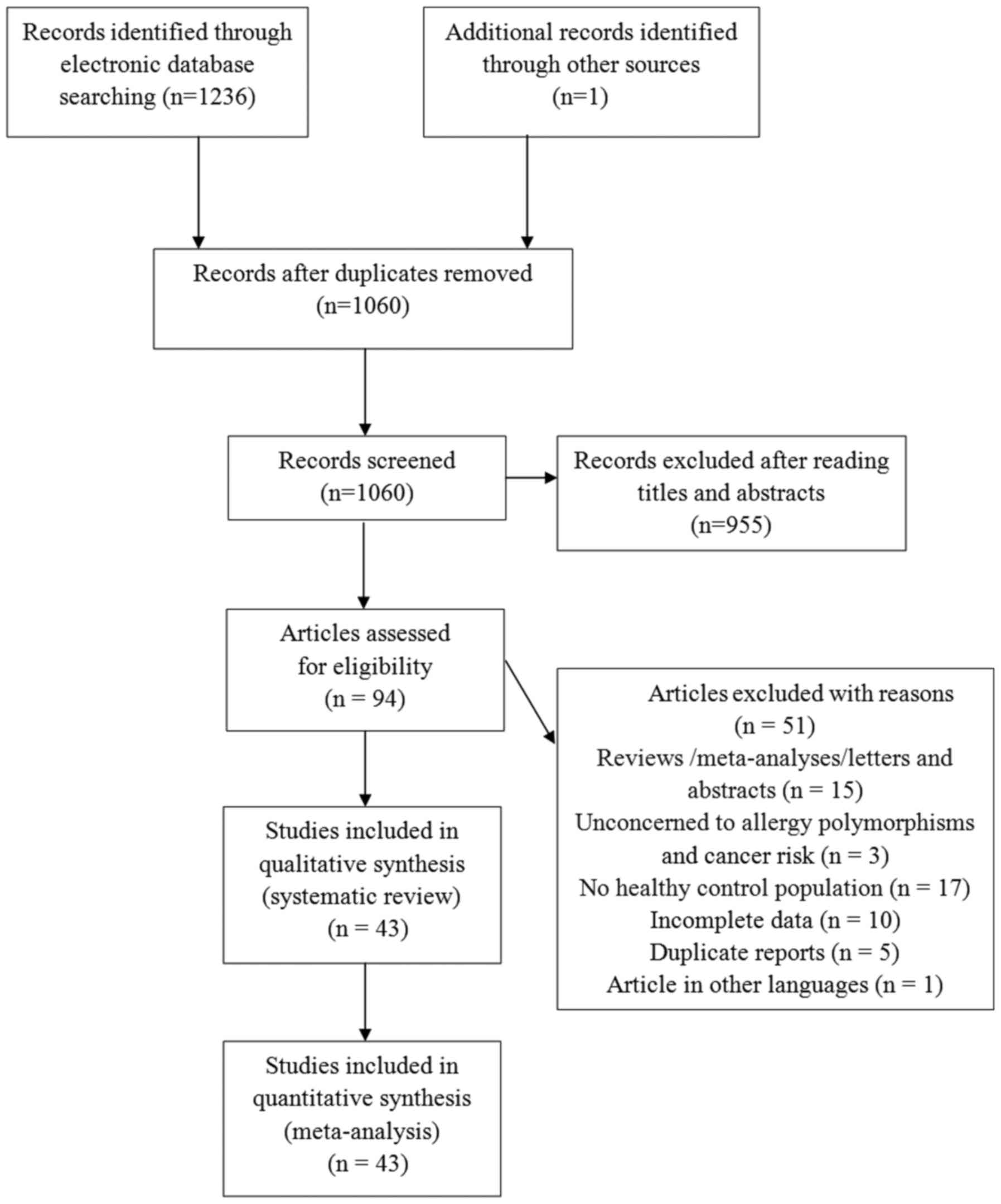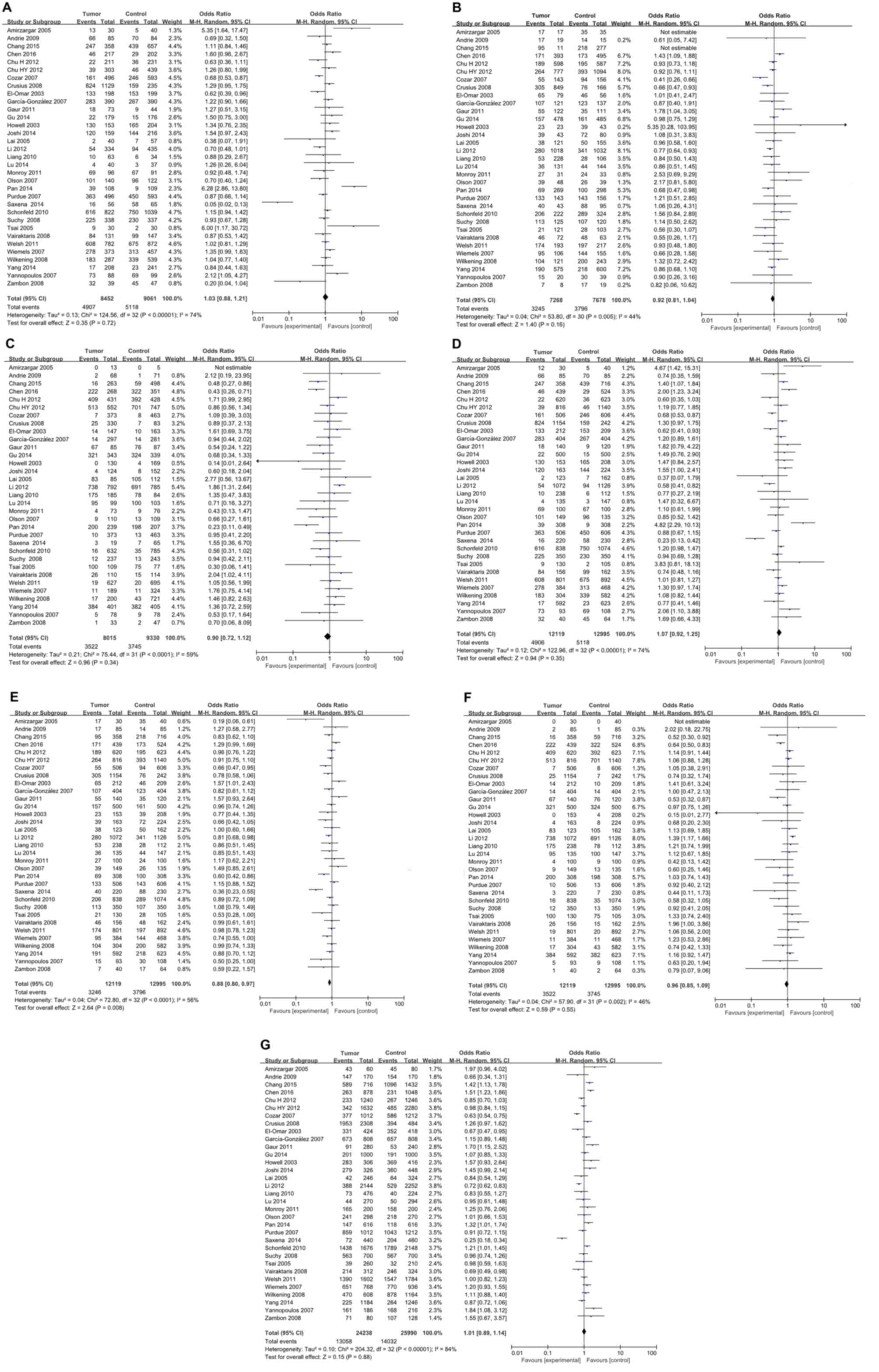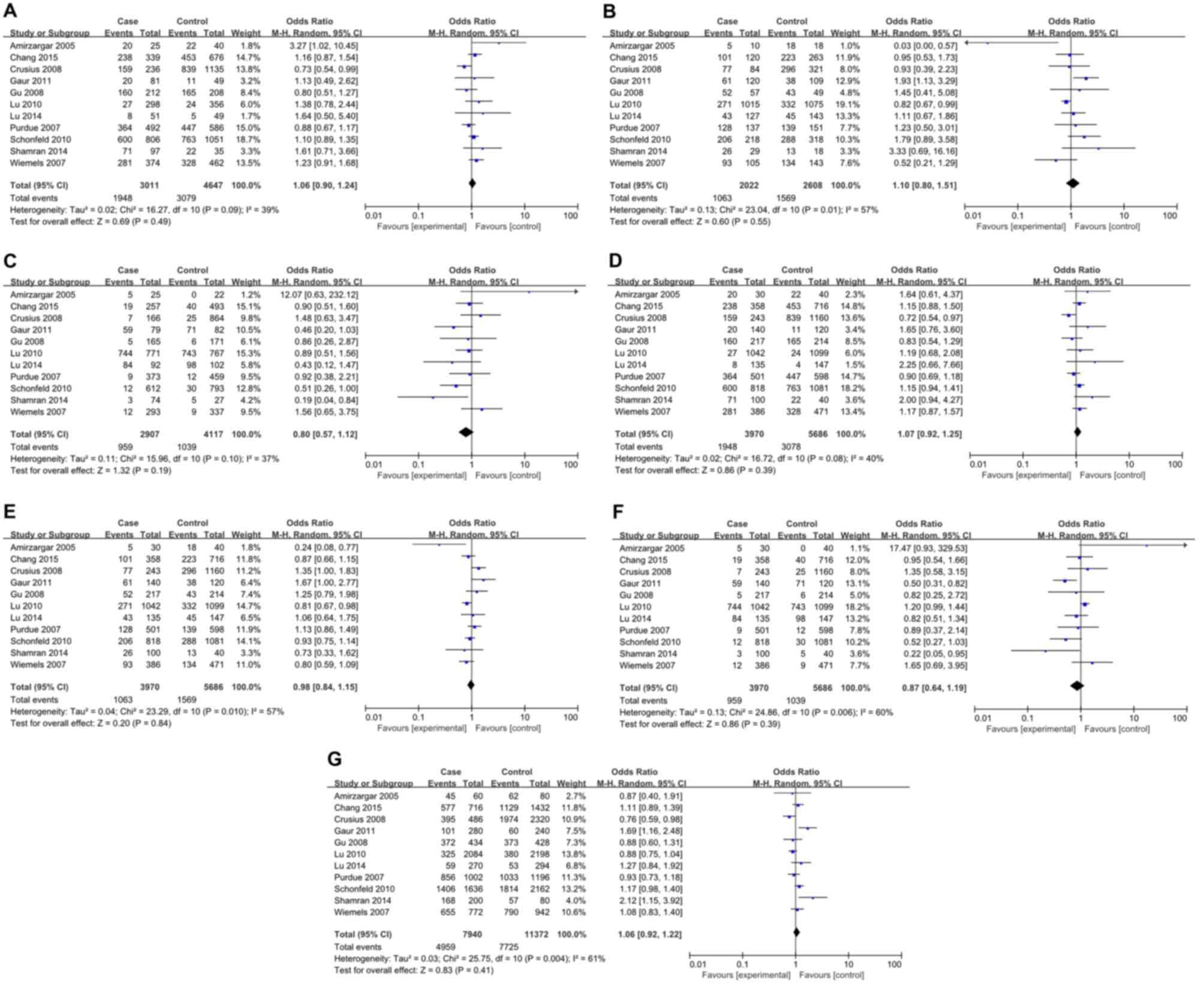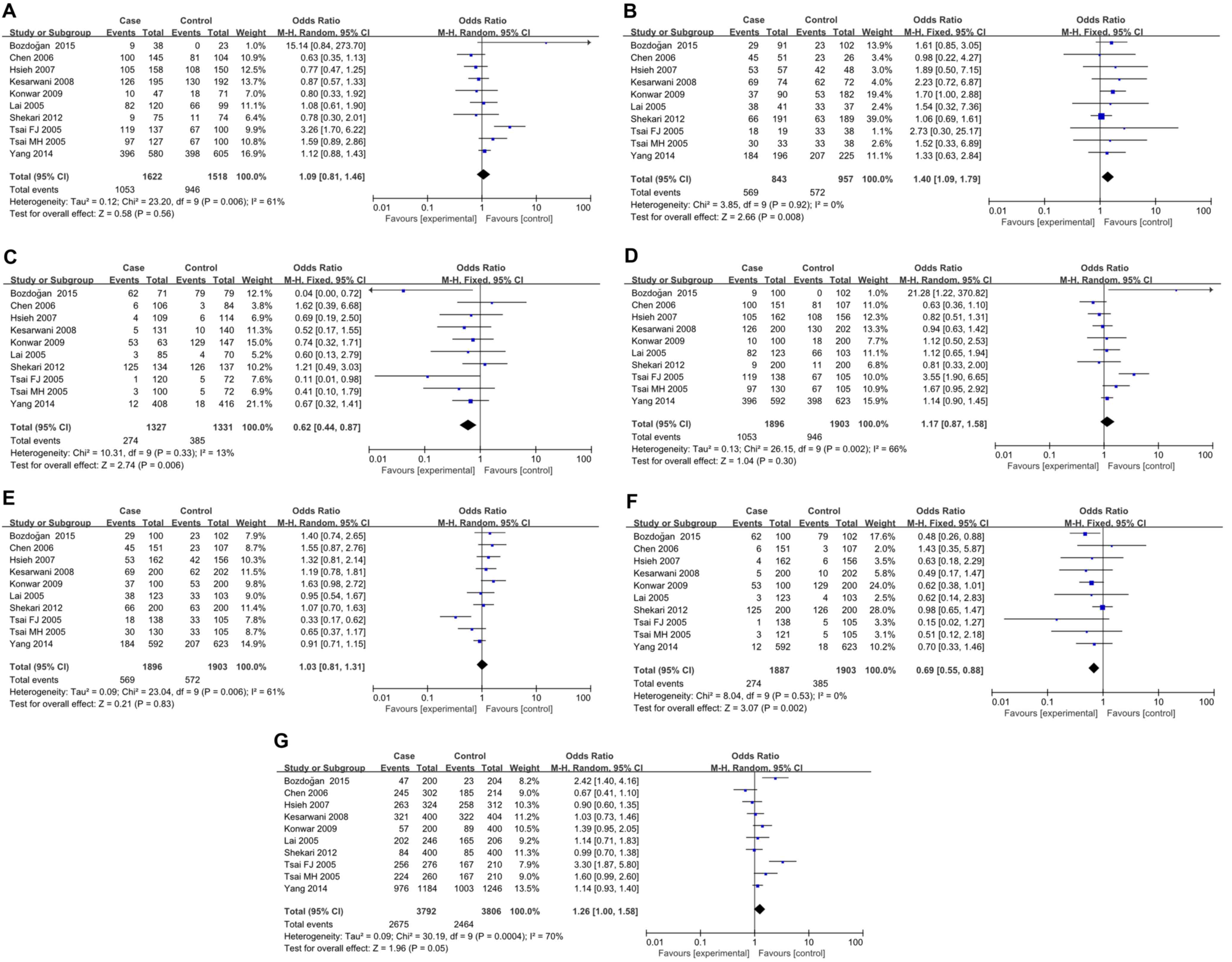|
1
|
Ferlay J, Soerjomataram I, Dikshit R, Eser
S, Mathers C, Rebelo M, Parkin DM, Forman D and Bray F: Cancer
incidence and mortality worldwide: Sources, methods and major
patterns in GLOBOCAN 2012. Int J Cancer. 136:E359–E386. 2015.
View Article : Google Scholar : PubMed/NCBI
|
|
2
|
Knox SS: From ‘omics’ to complex disease:
A systems biology approach to gene-environment interactions in
cancer. Cancer Cell Int. 10:112010. View Article : Google Scholar : PubMed/NCBI
|
|
3
|
Jang JP, Baek IC, Choi EJ and Kim TG:
Multiplex genotyping of cytokine gene SNPs using fluorescence bead
array. PLoS One. 10:e01180082015. View Article : Google Scholar : PubMed/NCBI
|
|
4
|
Balkwill F and Mantovani A: Inflammation
and cancer: Back to Virchow? Lancet. 357:539–545. 2001. View Article : Google Scholar : PubMed/NCBI
|
|
5
|
Leibovici D, Grossman HB, Dinney CP,
Millikan RE, Lerner S, Wang Y, Gu J, Dong Q and Wu X: Polymorphisms
in inflammation genes and bladder cancer: From initiation to
recurrence, progression, and survival. J Clin Oncol. 23:5746–5756.
2005. View Article : Google Scholar : PubMed/NCBI
|
|
6
|
Baniyash M: Chronic inflammation,
immunosuppression and cancer: New insights and outlook. Semin
Cancer Biol. 16:80–88. 2006. View Article : Google Scholar : PubMed/NCBI
|
|
7
|
Aggarwal BB, Vijayalekshmi RV and Sung B:
Targeting inflammatory pathways for prevention and therapy of
cancer: Short-term friend, long-term foe. Clin Cancer Res.
15:425–430. 2009. View Article : Google Scholar : PubMed/NCBI
|
|
8
|
Bidwell J, Keen L, Gallagher G, Kimberly
R, Huizinga T, McDermott MF, Oksenberg J, McNicholl J, Pociot F,
Hardt C and D'Alfonso S: Cytokine gene polymorphism in human
disease: On-line databases, supplement 1. Genes Immun. 2:61–70.
2001. View Article : Google Scholar : PubMed/NCBI
|
|
9
|
Wang HW and Joyce JA: Alternative
activation of tumor-associated macrophages by IL-4: Priming for
protumoral functions. Cell Cycle. 9:4824–4835. 2010. View Article : Google Scholar : PubMed/NCBI
|
|
10
|
Stang A: Critical evaluation of the
Newcastle-Ottawa scale for the assessment of the quality of
nonrandomized studies in meta-analyses. Eur J Epidemiol.
25:603–605. 2010. View Article : Google Scholar : PubMed/NCBI
|
|
11
|
Crusius JB, Canzian F, Capellá G, Peña AS,
Pera G, Sala N, Agudo A, Rico F, Del Giudice G, Palli D, et al:
Cytokine gene polymorphisms and the risk of adenocarcinoma of the
stomach in the European prospective investigation into cancer and
nutrition (EPIC-EURGAST). Ann Oncol. 19:1894–1902. 2008. View Article : Google Scholar : PubMed/NCBI
|
|
12
|
El-Omar EM, Rabkin CS, Gammon MD, Vaughan
TL, Risch HA, Schoenberg JB, Stanford JL, Mayne ST, Goedert J, Blot
WJ, et al: Increased risk of noncardia gastric cancer associated
with proinflammatory cytokine gene polymorphisms. Gastroenterology.
124:1193–1201. 2003. View Article : Google Scholar : PubMed/NCBI
|
|
13
|
García-González MA, Lanas A, Quintero E,
Nicolás D, Parra-Blanco A, Strunk M, Benito R, Simón M Angel,
Santolaria S, Sopeña F, et al: Gastric cancer susceptibility is not
linked to pro-and anti-inflammatory cytokine gene polymorphisms in
whites: A Nationwide Multicenter Study in Spain. Am J
Gastroenterol. 102:1878–1892. 2007. View Article : Google Scholar : PubMed/NCBI
|
|
14
|
Lai KC, Chen WC, Jeng LB, Li SY, Chou MC
and Tsai FJ: Association of genetic polymorphisms of MK, IL-4, p16,
p21, p53 genes and human gastric cancer in Taiwan. Eur J Surg
Oncol. 31:1135–1140. 2005. View Article : Google Scholar : PubMed/NCBI
|
|
15
|
Pan XF, Wen Y, Loh M, Wen YY, Yang SJ,
Zhao ZM, Tian Z, Huang H, Lan H, Chen F, et al: Interleukin-4 and
−8 gene polymorphisms and risk of gastric cancer in a population in
Southwestern China. Asian Pac J Cancer Prev. 15:2951–2957. 2014.
View Article : Google Scholar : PubMed/NCBI
|
|
16
|
Zambon CF, Basso D, Marchet A, Fasolo M,
Stranges A, Schiavon S, Navaglia F, Greco E, Fogar P, Falda A, et
al: IL-4-588C>T polymorphism and IL-4 receptor alpha
[Ex5+14A>G; Ex11+828A>G] haplotype concur in selecting H.
pylori cagA subtype infections. Clin Chim Acta. 389:139–145. 2008.
View Article : Google Scholar : PubMed/NCBI
|
|
17
|
Liang XL, Hu HB, Jia AP and Liu ZP:
Association of PTPN11 and interleukin-4 gene polymorphisms and
helicobacter pylori infection with susceptibility to gastric
cancer. Hai Nan Yi Xue. 2010:1–5. 2010.(In Chinese).
|
|
18
|
Chu H, Wang M, Yan F, Zhong D, Shi D, Ma
L, Pan X, Qin C, Yin C and Zhang Z: Polymorphisms in the IL-13 and
IL-4R genes are associated with the development of renal cell
carcinoma. Ann Oncol. 23:2114–2121. 2012. View Article : Google Scholar : PubMed/NCBI
|
|
19
|
Cozar JM, Romero JM, Aptsiauri N, Vazquez
F, Vilchez JR, Tallada M, Garrido F and Ruiz-Cabello F: High
incidence of CTLA-4 AA (CT60) polymorphism in renal cell cancer.
Hum Immunol. 68:698–704. 2007. View Article : Google Scholar : PubMed/NCBI
|
|
20
|
Joshi NN, Bhat S, Hake S, Kale M and
Kannan S: Opposing effects of pro- and anti-inflammatory cytokine
gene polymorphisms on the risk for breast cancer in western Indian
women: A pilot study. Int J Immunogenet. 41:242–249. 2014.
View Article : Google Scholar : PubMed/NCBI
|
|
21
|
Schonfeld SJ, Bhatti P, Brown EE, Linet
MS, Simon SL, Weinstock RM, Hutchinson AA, Stovall M, Preston DL,
Alexander BH, et al: Polymorphisms in oxidative stress and
inflammation pathway genes, low-dose ionizing radiation, and the
risk of breast cancer among US radiologic technologists. Cancer
Causes Control. 21:1857–1866. 2010. View Article : Google Scholar : PubMed/NCBI
|
|
22
|
Chen J, Ying XM, Huang XM, Huang P and Yan
SC: Association between polymorphisms in selected inflammatory
response genes and the risk of prostate cancer. Onco Targets Ther.
9:223–229. 2016.PubMed/NCBI
|
|
23
|
Olson SH, Orlow I, Simon J, Tommasi D, Roy
P, Bayuga S, Ludwig E, Zauber AG and Kurtz RC: Allergies, variants
in IL-4 and IL-4R alpha genes, and risk of pancreatic cancer.
Cancer Detect Prev. 31:345–351. 2007. View Article : Google Scholar : PubMed/NCBI
|
|
24
|
Welsh MM, Karagas MR, Kuriger JK, Houseman
A, Spencer SK, Perry AE and Nelson HH: Genetic determinants of
UV-susceptibility in non-melanoma skin cancer. PLoS One.
6:e200192011. View Article : Google Scholar : PubMed/NCBI
|
|
25
|
Howell WM, Turner SJ, Theaker JM and
Bateman AC: Cytokine gene single nucleotide polymorphisms and
susceptibility to and prognosis in cutaneous malignant melanoma.
Eur J Immunogenet. 30:409–414. 2003. View Article : Google Scholar : PubMed/NCBI
|
|
26
|
Andrie E, Michos A, Kalampoki V,
Pourtsidis A, Moschovi M, Polychronopoulou S,
Athanasiadou-Piperopoulou F, Kalmanti M, Hatzakis A, Paraskevis D,
et al: Genetic variants in immunoregulatory genes and risk for
childhood lymphomas. Eur J Haematol. 83:334–342. 2009. View Article : Google Scholar : PubMed/NCBI
|
|
27
|
Monroy CM, Cortes AC, Lopez MS, D'Amelio
AM Jr, Etzel CJ, Younes A, Strom SS and El-Zein RA: Hodgkin disease
risk: Role of genetic polymorphisms and gene-gene interactions in
inflammation pathway genes. Mol Carcinog. 50:36–46. 2011.
View Article : Google Scholar : PubMed/NCBI
|
|
28
|
Gaur P, Mittal M, Mohanti B and Das S:
Functional variants of IL4 and IL6 genes and risk of
tobacco-related oral carcinoma in high-risk Asian Indians. Oral
Dis. 17:720–726. 2011. View Article : Google Scholar : PubMed/NCBI
|
|
29
|
Tsai MH, Chen WC, Tsai CH, Hang LW and
Tsai FJ: Interleukin-4 gene, but not the interleukin-1 beta gene
polymorphism, is associated with oral cancer. J Clin Lab Anal.
19:93–98. 2005. View Article : Google Scholar : PubMed/NCBI
|
|
30
|
Vairaktaris E, Yapijakis C, Serefoglou Z,
Avgoustidis D, Critselis E, Spyridonidou S, Vylliotis A, Derka S,
Vassiliou S, Nkenke E and Patsouris E: Gene expression
polymorphisms of interleukins-1 beta, −4, −6, −8, −10, and tumor
necrosis factors-alpha, -beta: Regression analysis of their effect
upon oral squamous cell carcinoma. J Cancer Res Clin Oncol.
134:821–832. 2008. View Article : Google Scholar : PubMed/NCBI
|
|
31
|
Lu Y, Wu Z, Peng Q, Ma L, Zhang X, Zhao J,
Qin X and Li S: Role of IL-4 gene polymorphisms in HBV-related
hepatocellular carcinoma in a Chinese population. PLoS One.
9:e1100612014. View Article : Google Scholar : PubMed/NCBI
|
|
32
|
Saxena R, Chawla YK, Verma I and Kaur J:
Effect of IL-12B, IL-2, TGF-β1, and IL-4 polymorphism and
expression on hepatitis B progression. J Interferon Cytokine Res.
34:117–128. 2014. View Article : Google Scholar : PubMed/NCBI
|
|
33
|
Li X, Shi W, Yu G, Lin L, Yang B, Li J,
Guo W, Tang C, Wang H, Gao H, et al: Interleukin-4 −590T/C
polymorphism influences the susceptibility to nonsmall cell lung
cancer. DNA Cell Biol. 31:797–800. 2012. View Article : Google Scholar : PubMed/NCBI
|
|
34
|
Gu J, Shen Y and Zhang Y: Association
between interleukin-4 polymorphisms and environment and nonsmall
cell lung cancer in Chinese population. J Cancer Res Ther. 10
Suppl:C135–C139. 2014. View Article : Google Scholar : PubMed/NCBI
|
|
35
|
Chang WS, Wang SC, Chuang CL, Ji HX, Hsiao
CL, Hsu CM, Tsai CW, Liu SP, Hsu PC, Lo YL and Bau DT: Contribution
of interleukin-4 genotypes to lung cancer risk in Taiwan.
Anticancer Res. 35:6297–6301. 2015.PubMed/NCBI
|
|
36
|
Suchy J, Kłujszo-Grabowska E, Kładny J,
Cybulski C, Wokołorczyk D, Szymańska-Pasternak J, Kurzawski G,
Scott RJ and Lubiński J: Inflammatory response gene polymorphisms
and their relationship with colorectal cancer risk. BMC Cancer.
8:1122008. View Article : Google Scholar : PubMed/NCBI
|
|
37
|
Wilkening S, Tavelin B, Canzian F, Enquist
K, Palmqvist R, Altieri A, Hallmans G, Hemminki K, Lenner P and
Försti A: Interleukin promoter polymorphisms and prognosis in
colorectal cancer. Carcinogenesis. 29:1202–1206. 2008. View Article : Google Scholar : PubMed/NCBI
|
|
38
|
Yannopoulos A, Nikiteas N,
Chatzitheofylaktou A and Tsigris C: The (−590 C/T) polymorphism in
the interleukin-4 gene is associated with increased risk for early
stages of corolectal adenocarcinoma. In Vivo. 21:1031–1035.
2007.PubMed/NCBI
|
|
39
|
Wiemels JL, Wiencke JK, Kelsey KT,
Moghadassi M, Rice T, Urayama KY, Miike R and Wrensch M:
Allergy-related polymorphisms influence glioma status and serum IgE
levels. Cancer Epidemiol Biomarkers Prev. 16:1229–1235. 2007.
View Article : Google Scholar : PubMed/NCBI
|
|
40
|
Purdue MP, Sakoda LC, Graubard BI, Welch
R, Chanock SJ, Sesterhenn IA, Rubertone MV, Erickson RL and McGlynn
KA: A case-control investigation of immune function gene
polymorphisms and risk of testicular germ cell tumors. Cancer
Epidemiol Biomarkers Prev. 16:77–83. 2007. View Article : Google Scholar : PubMed/NCBI
|
|
41
|
Chu H, Ma L, Wang M, Shi D, Qin C, Yuan L,
Yin C and Zhang Z: The polymorphisms of IL-4, IL-4R and IL-13 genes
and bladder cancer risk in a Chinese population: A case-control
study. Mol Biol Rep. 39:5349–5357. 2012. View Article : Google Scholar : PubMed/NCBI
|
|
42
|
Amirzargar AA, Bagheri M, Ghavamzadeh A,
Alimoghadam K, Khosravi F, Rezaei N, Moheydin M, Ansaripour B,
Moradi B and Nikbin B: Cytokine gene polymorphism in Iranian
patients with chronic myelogenous leukaemia. Int J Immunogenet.
32:167–171. 2005. View Article : Google Scholar : PubMed/NCBI
|
|
43
|
Shamran HA, Hamza SJ, Yaseen NY,
Al-Juboory AA, Taub DD, Price RL, Nagarkatti M, Nagarkatti PS and
Singh UP: Impact of single nucleotide polymorphism in IL-4, IL-4R
genes and systemic concentration of IL-4 on the incidence of glioma
in Iraqi patients. Int J Med Sci. 11:1147–1153. 2014. View Article : Google Scholar : PubMed/NCBI
|
|
44
|
Lu Y: Association of variants of
inflammation and immunity genes with susceptibility to gastric
cancer. Nanjing Medical University; 2010, (In Chinese).
|
|
45
|
Gu F, Qureshi AA, Niu T, Kraft P, Guo Q,
Hunter DJ and Han J: Interleukin and interleukin receptor gene
polymorphisms and susceptibility to melanoma. Melanoma Res.
18:330–335. 2008. View Article : Google Scholar : PubMed/NCBI
|
|
46
|
Chen XL: TNF-β IL-4 genes polymorphisms
and Helicobacter pylori in gastric cancer and duodenal ulcer in the
Chinese. Fujian Medical University; 2006, (In Chinese).
|
|
47
|
Tsai FJ, Chang CH, Chen CC, Hsia TC, Chen
HY and Chen WC: Interleukin-4 gene intron-3 polymorphism is
associated with transitional cell carcinoma of the urinary bladder.
BJU Int. 95:432–435. 2005. View Article : Google Scholar : PubMed/NCBI
|
|
48
|
Bozdoğan ST, Erol B, Dursun A, Bozdoğan G,
Dönmez I, Mungan NA and Seydaoglu G: The IL-1RN and IL-4 gene
polymorphisms are potential genetic markers of susceptibility to
bladder cancer: A case-control study. World J Urol. 33:389–395.
2015. View Article : Google Scholar : PubMed/NCBI
|
|
49
|
Hsieh YY, Chang CC, Tsai CH, Lin CC and
Tsai FJ: Interleukin (IL)-12 receptor beta1 codon 378 G homozygote
and allele, but not IL-1 (beta-511 promoter, 3953 exon 5, receptor
antagonist), IL-2 114, IL-4-590 intron 3, IL-8 3′-UTR2767, and
IL-18 105, are associated with higher susceptibility to leiomyoma.
Fertil Steril. 87:886–895. 2007. View Article : Google Scholar : PubMed/NCBI
|
|
50
|
Shekari M, Kordi-Tamandani DM, MalekZadeh
K, Sobti RC, Karimi S and Suri V: Effect of anti-inflammatory
(IL-4, IL-10) cytokine genes in relation to risk of cervical
carcinoma. Am J Clin Oncol. 35:514–519. 2012. View Article : Google Scholar : PubMed/NCBI
|
|
51
|
Konwar R, Chaudhary P, Kumar S, Mishra D,
Chattopadhyay N and Bid HK: Breast cancer risk associated with
polymorphisms of IL-1RN and IL-4 gene in Indian women. Oncol Res.
17:367–372. 2009. View Article : Google Scholar : PubMed/NCBI
|
|
52
|
Kesarwani P, Ahirwar DK, Mandhani A and
Mittal RD: Association between-174 G/C promoter polymorphism of the
interleukin-6 gene and progression of prostate cancer in North
Indian population. DNA Cell Biol. 27:505–510. 2008. View Article : Google Scholar : PubMed/NCBI
|
|
53
|
Yang CM, Chen HC, Hou YY, Lee MC, Liou HH,
Huang SJ, Yen LM, Eng DM, Hsieh YD and Ger LP: A high IL-4
production diplotype is associated with an increased risk but
better prognosis of oral and pharyngeal carcinomas. Arch Oral Biol.
59:35–46. 2014. View Article : Google Scholar : PubMed/NCBI
|
|
54
|
Salimi S, Mohammadoo-Khorasani M, Yaghmaei
M, Mokhtari M and Moossavi M: Possible association of IL-4 VNTR
polymorphism with susceptibility to preeclampsia. Biomed Res Int.
2014:4970312014. View Article : Google Scholar : PubMed/NCBI
|


















